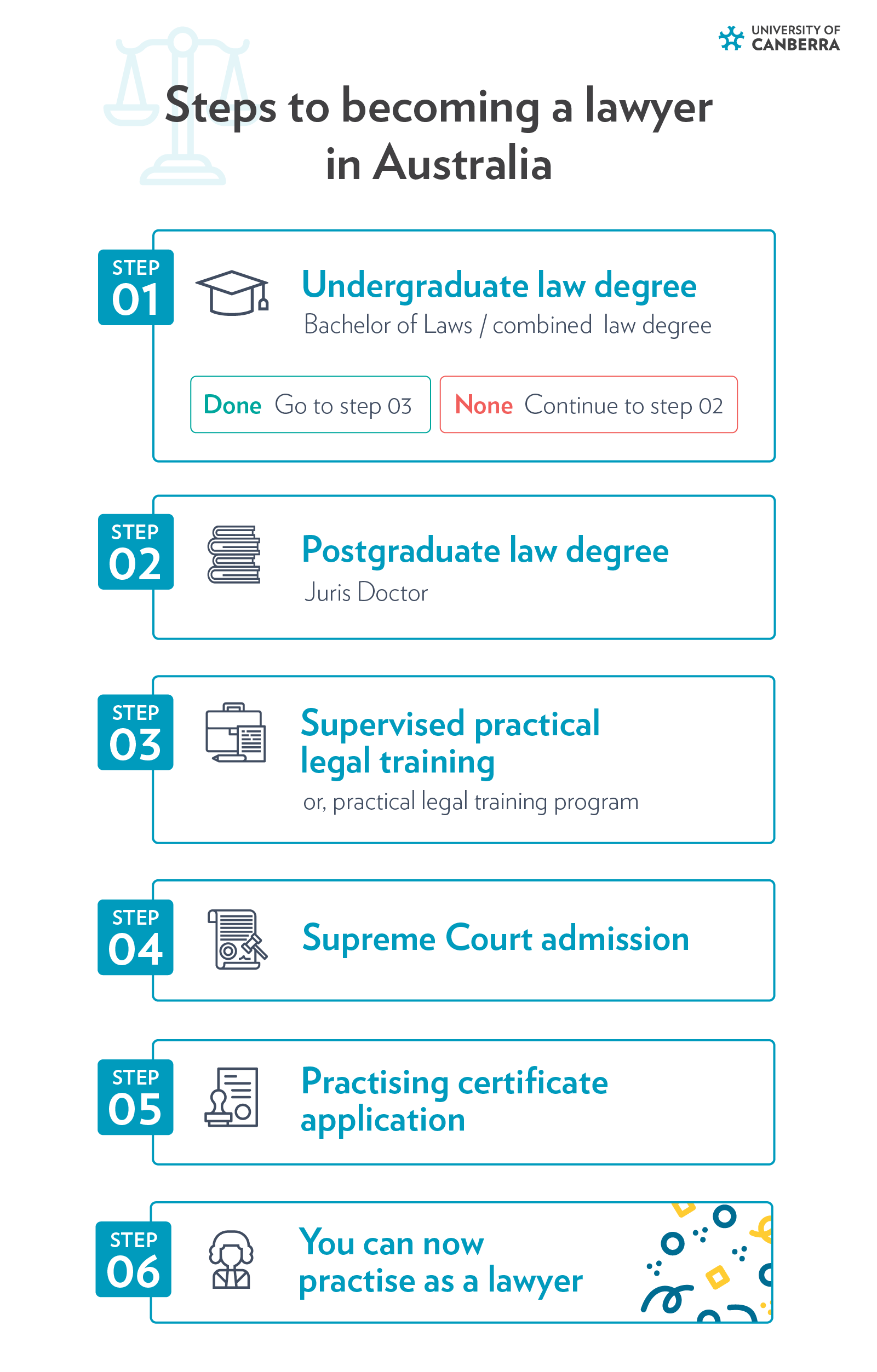How to become a lawyer in Australia

A lawyer is a qualified professional who can offer legal advice or represent clients in court. However, oftentimes the term ‘lawyer’ can encompass a wide range of roles and responsibilities in different sectors, for example:
- government
- corporate
- NGOs
- community organisations.
Law professionals can range from barristers – independent law specialists and advisers – to corporate lawyers who specialise in everything from construction to copyright. And, of course, they also include mediators, judges and specialists in specific social issues, such as women’s rights.
The sheer breadth of pathways available means that while law can seem like an exciting career choice, it can be a daunting process to figure out.
We’ve created this guide for anyone who wants to become a lawyer or pursue a career in law in Australia and needs help determining:
- where to begin
- which questions to ask about your law degree
- which of the different ways to become a lawyer is right for you.
Regardless of your age, previous area of study or professional experience, it’s possible to study for a career in law. Whether you’re a professional with an established career who’s looking for a change, or a graduate with a degree in a different discipline, this guide will help you identify the best degree option for your specific goals and situation.
Why become a lawyer?
Law is often thought of as a ‘noble profession’, according to University of Canberra Associate Professor, Dr Trevor Ryan, who teaches Legal Theory and Constitutional Law. Becoming a lawyer can also be an excellent choice for someone who wants to make a real difference in their community.
“In the media, we often see lawyers defending the interests of disadvantaged groups,” Dr Ryan says. “But on the other hand, sometimes lawyers are dramatised as unethical and self-serving for fictional TV shows.”
The reality, he adds, is that here in Australia, lawyers operate within a framework of strict rules and legal ethics. So if a lawyer knows that their client is guilty, they can access this framework and consult with the law society for guidance. They’re never on their own.
And on a practical level, despite the profession’s unique challenges and contradictions, it continues to be a good career for the future, with a high salary potential.

Infographic Transcript
Steps to becoming a lawyer in Australia
- Step 1: To progress in your legal career, you must first obtain an undergraduate law degree, such as a Bachelor of Laws or a combined law degree. If you have this qualification, you can move on to Step 3. If not, proceed to Step 2.
- Step 2: Pursue a postgraduate law degree (Juris Doctor).
- Step 3: Next, enrol in a supervised practical legal training or practical legal training program.
- Step 4: Apply for admission to the Supreme Court.
- Step 5: Submit your application for a practicing certificate.
- Step 6: Congratulations, you are now ready to practice as a lawyer.
How to qualify as a lawyer in Australia
Step 1: Choose a law degree
If you want to study to become a lawyer in Australia, you have two degree options:
- an undergraduate Bachelor of Laws (LLB) degree
- a postgraduate Juris Doctor (JD) degree if you already have a bachelor’s degree in another discipline.
Regardless of which course you do, to be able to be admitted into practice as a legal practitioner in Australia, you’ll need to complete the ‘Priestley 11’ successfully. While every university’s course structure will vary, these 11 law subjects are an essential component of any law degree and cover the following subjects:
- Administrative Law
- Civil Procedure
- Corporations Law
- Contract Law
- Criminal Law and Procedure
- Equity and Trusts Law
- Ethics and Professional Responsibility
- Evidence Law
- Federal and State Constitutional Law
- Property Law
- Torts Law
Step 2: Choose electives
You can also choose between several areas of law to specialise in through your elective units. You’ll probably want to learn about as many of these areas as possible before choosing your specialisation.
Dr Ryan says that the University of Canberra’s law curriculum offers students a chance to explore different branches of the law early. This makes it easier to choose electives in the areas that you like later on.
“In the [online] Juris Doctor degree, you start off with core units and then branch out into those electives and research or internship units,” he explains.
“We advise students to think about their majors right from the beginning, though – for example, whether they want to focus on the commercial or justice sectors.”
Students of our online Juris Doctor degree can explore electives like:
- Law, Innovation and Technologies
- Law Reform and Social Change
- Human Rights Law
- Intellectual Property
- Workplace Law in Context
- Negotiation
Having a general idea of the direction you want to practise as a lawyer can help you choose the right electives or specialisation.
Step 3: Practical Legal Training (PLT)
After you complete your university degree, you will also need to do Practical Legal Training (PLT).
PLT is all about developing practical skills and knowledge to practise as a graduate lawyer. It includes a combination of subjects, which help you learn the specifics of working in a firm or organisation, and also work experience under an approved senior practitioner.
The specific rules of PLT depend on what Australian state or territory you are in. You may have the choice of:
- a non-tertiary course and/or on-the-job training or
- a certificate, diploma or degree course.
A Graduate Diploma of Legal Practice is a common way to complete PLT, with courses running from 6-12 months. Some universities may also give you the option to extend your PLT and gain a Master of Laws (Legal Practice).
As a general rule students must finish their degree prior to commencing any PLT program. However, there are exceptions to this. For example, if there are no more than two electives and all Priestly 11 subjects are completed, the student can apply to their local admitting authority for permission to commence the PLT program early.
Each jurisdiction has slightly different rules about this eligibility. The first thing for any student in this position to do is to contact the relevant admitting authority and follow their process to ensure that they have met the requirements of the jurisdiction to seek approval.
Step 4: Application to the admission board or the Supreme Court
After your placement, you’ll need to apply for admission to the admissions board or Supreme Court in your state or territory within five years of graduating.
To be admitted as a lawyer in Australia, you need to satisfy three requirements:
- You’ve completed a law degree or equivalent course (LLB or JD)
- You’ve undertaken a Practical Legal Training (PLT) program, which results in the award of the Graduate Diploma of Legal Practice
- You’re a fit and proper person
|
Region |
Admitting Authority |
Court |
|---|---|---|
|
Australian Capital Territory |
||
|
New South Wales |
||
|
Northern Territory |
||
|
Queensland |
Queensland Legal Practitioners Admissions Board (See the Queensland Courts website or the Queensland Law Society website) |
|
|
South Australia |
Legal Practitioners Education and Admission Council (See the Law Society of South Australia website) |
|
|
Tasmania |
Board of Legal Education (See the Law Society of Tasmania website) |
|
|
Victoria |
Council of Legal Education – Victorian Legal Admissions Board |
|
|
Western Australia |
Step 5: Obtain a Practising Certificate
Before you can practise as a solicitor, in addition to being admitted to the legal profession, you also need to hold a practising certificate.
A practising certificate is basically a licence which allows a solicitor to provide legal services.
During the first 18 months or two years of legal practice after your admission, you will have a condition imposed on your practising certificate that you may only practise law under supervision.
Depending on the jurisdiction you wish to practise in, you can choose up to three pathways to take after being admitted.
You can:
- Apply for a solicitor's practising certificate;
- You can complete the Bar Practice Court, join the Bar Association and become a barrister; or
- Apply for a role that is exempt from this fourth stage (for some).
Unsure of the steps to becoming a lawyer? Visit our website and set up a call with one of our Student Enrolment Advisers to answer your questions about your pathways to law.
Different ways to use your law degree after graduation
Whichever law degree you graduate with, you’ll have a wide range of career options to choose from. As a law student, you’ll likely graduate with a highly methodical, logical way of thinking that’s useful in management. You’ll also be able to form and articulate arguments, which is essential in lobbying for policy reform or advocacy.
Additionally, Dr Ryan says, you can transfer the legal skills you’ve learned across many industries and sectors. “As a lawyer, you might find yourself negotiating or drafting contracts, acting as a policy adviser to the government, or working in litigation or in big corporate law firms,” he says.
Other specialist areas of law, such as patents, often have extra requirements. These might include:
- holding a bachelor’s degree in engineering or science
- completing relevant work experience
- passing exams set by the relevant boards
- applying for a practising certificate.
If advocacy interests you, becoming a barrister is a natural choice after you graduate. And Dr Ryan believes that you’ll naturally figure out whether you want to be a barrister during your degree.
“It might be through competition or mooting style, assessments, activities or electives involving advocacy,” he says. “Regardless, it soon becomes obvious to you whether being a barrister is right for you.”
If you do want to become a barrister in Australia, you’ll have to meet additional requirements. These involve completing an extra course of study, called a reading, which starts with passing a bar exam testing knowledge in procedure, evidence and legal ethics.
Additionally, Dr Ryan says, a good barrister must develop a wide range of general knowledge, adapt quickly to new facts and think on their feet.

Should I study a Bachelor of Laws or a Juris Doctor?
When you’re choosing a course to help you become a lawyer, it’s important to consider both your professional goals and your current situation.
While both a Bachelor of Laws and a Juris Doctor degree can be a step towards becoming a lawyer in Australia, the two degrees differ in their:
- admission criteria
- number of intakes per year
- time required for completion.
A Bachelor of Laws degree is ideal if you have no prior work experience or other undergraduate qualification, or you’re coming straight from high school. The degree covers a broad overview of the law, including legal theory and principles.
A Juris Doctor degree provides a pathway into law if you already have a non-law undergraduate qualification. The degree is focused on more practical applications and offers a postgraduate level of expertise.
When might a Juris Doctor degree work better for you?
If you’re an ambitious working professional looking to gain the skills necessary to progress in your career as an ethical legal practitioner, an online Juris Doctor may just be what you’re looking for.
Dr Ryan believes that completing a Juris Doctor degree can be ideal if you want to practise law in emerging areas like:
- intellectual property
- health
- government
- new finance technologies.
“It can act as both a flexible entry point into highly paid, powerful professions in business or politics, or as a means to give back to the community,” he adds. “At the same time, it also gives you the power to advocate for people if you want to work in NGOs, in community legal services or government law.”
As with other professions, the pandemic has transformed the way lawyers work. As businesses move away from fixed offices, lawyers can choose their own hours and work in firms with a flatter, more collaborative structure. That’s good news if you’re seeking an exciting career but want to balance it with family responsibilities.
Can I do a Juris Doctor online?
Yes - today, many universities offer Juris Doctor degrees online.
Choosing to study online is an attractive option for many students, including those who wish to continue working full time while they study. As an online student, you can design a study schedule that works for you, allowing you to balance your work and home life alongside study. There is also no time spent travelling to campus, and you can choose when and where you study, as well as what device you use.
Your online Juris Doctor will give you exactly the same qualification as an on-campus equivalent, giving you the knowledge required to satisfy academic requirements for admission to legal practice.
What to expect from a postgraduate online Juris Doctor degree
Our online Juris Doctor should provide you with the legal fundamentals, advanced theoretical and technical knowledge and practical dispute resolution skills to help you get to the next stage in your career.
What is included in the course?
Aside from all Priestley 11 units aforementioned, which will help you satisfy all the academic requirements for admission to legal practice, you’ll need to complete the foundation units, all additional core units, at least one of the three Research and Internship Stream units and remaining electives to graduate with our online Juris Doctor.
You will get hands-on experience through the completion of a research-based project or by undertaking a law internship.
How long will it take?
Our online Juris Doctor is four years part-time, or can be fast-tracked to three years depending on individual study path and unit availability. Each unit is seven weeks long and will typically require a minimum of 15–20 hours of online study per week.
Our online Juris Doctor degree also includes a Graduate Certificate in Legal Studies and a Graduate Diploma in Legal Studies. The graduate diploma is both an entry and exit point and is 16 months long. However, the graduate certificate is an exit point from the Graduate Diploma in Legal Studies or the Juris Doctor and spans eight months.
What is the criteria for admission?
To be eligible for the Juris Doctor, you must hold an undergraduate degree (or equivalent) in any non-law discipline, with a GPA of at least 5/7. You’ll also need to achieve an overall IELTS Academic score (or equivalent) of 6.5, with no band score below 6.0.
When can I start?
We offer six intakes each year for domestic students: January, March, May, July, September and October.
How much does a Juris Doctor cost?
For detailed information on tuition fees, please contact our admissions team directly. We're committed to providing accessible and affordable education options.
Why study University of Canberra’s Juris Doctor degree online?
There are many benefits to choosing to study your online Juris Doctor with University of Canberra.
Recognised qualification
Encompassing all Priestley 11 subjects, you’ll gain the prescribed knowledge to satisfy the academic requirements for admission to legal practice.
Expert support
You’ll learn from leading academics and industry experts, alongside the support of a dedicated professional Student Success Adviser.
Be job ready
The course will help you develop your skills and expand your career options in a variety of legal areas.
Benefit from flexibility
With six intakes a year, our online Juris Doctor degree can help you fast-track your law studies so you can take the next step and achieve your career goals quicker.
Accredited degree
Our Juris Doctor degree provides the academic requirements to practise law in Australia and serves as a basis for admission in all Australian jurisdictions.
Learn more about University of Canberra’s online Juris Doctor today.



